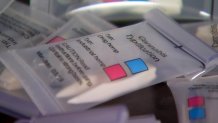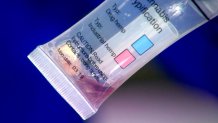When the Texas legislature recently passed a law legalizing CBD oil, police had a new problem on their hands -- how to determine the difference between CBD and marijuana, which remains illegal in the state.
Currently, law enforcement does not have all the tools they need to make that call.
But a possible solution may already exist -- in a place faraway, known for fine chocolate, expensive watches and snow skiing.
It's a roadside drug test, developed in Zurich, Switzerland and already adopted by some police departments in Florida, that help differentiate between pot and CBD.

Following several other states throughout the country, Texas in June legalized CBD, but only if it contained little or no THC, the component that, in larger amounts, produces a high in marijuana.
The change seemed to take Texas police by surprise, because it required them to measure the amounts of THC in cannabis -- something they were not equipped to do -- before they could file a marijuana case.
Local
The latest news from around North Texas.
Before June, all police needed to do to make a case was to determine whether the substance contained any cannabinoids, with no requirement to find the precise quantity of THC.
The Swiss field test is designed to determine the ratio of THC to CBD to give officers a sense of whether it contains more of one than the other, according to the Zurich Forensic Science Institute, the police crime lab that developed the test.

"And we are happy if the test is used successfully in other countries as well," said Michael Bovins, a forensic scientist at the institute.
NBC 5 Investigates has learned that the Dallas Police Department has inquired about the new field test. Arlington police have also contacted the Florida distributor to learn more.
And the Texas Department of Public Safety said in an email they are awaiting the findings of the federal Drug Enforcement Administration, which is "in the process of validating a commercial field test -- or any other commercial test."
Police in Fort Worth said they were unaware of the test but wanted to learn about it.
In Florida, several police departments are using, or planning to use, the new tests, with one sheriff's department sending a notice to its officers that said: "Current THC test kits must be disposed of and replaced with the new tests kits supplied by Syndicate Alliance," the U.S. distributor of the kits.
The tests are also being evaluated in the state forensic crime lab in Virginia, where one official said police may begin using them in the near future.
In Texas, however, law enforcement officials said they are still looking for the tools they need to measure THC, so that they can respect the new law that says CBD is legal, and enforce the old one that says marijuana is not.
"A drug dog can't do it, nor can a presumptive test," said Dallas County District Attorney John Creuzot, referring to the old testing tactics used by police. "And so we can't distinguish something legal from illegal, and that's across the state."
Creuzot and other law enforcement officials have noted that law enforcement drug labs in Texas also currently lack equipment to test for the percentage of THC in a substance. That shortcoming has led Creuzot, and several other DAs across Texas, to temporarily stop prosecuting misdemeanor marijuana cases until a test can be performed that separates marijuana from hemp.
Texas Gov. Greg Abbott was critical of the DAs positions, and urged them in a letter Thursday to continue to "faithfully uphold the law." Creuzot responded to the governor's letter saying he wouldn't prosecute people without having evidence of their guilt.
The Department of Public Safety lab and Dallas County forensic labs are currently working to establish that testing capability.



